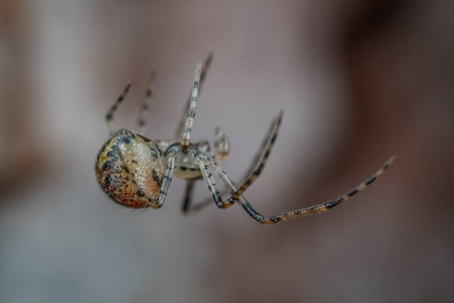Can House Spiders Bite?
Yes, house spiders can bite.
Do House Spiders Bite?
House spiders are generally very reluctant to bite humans or pets. Bites are extremely rare and usually occur only under certain circumstances:
Accidental contact: Most bites happen when a house spider is trapped against the skin—e.g., rolled over in bedding, squished in clothing, or pressed against the skin while handling items where spiders are hiding.
Provocation or threat: If a spider feels cornered or threatened—such as being grabbed, poked, or disturbed—it may bite defensively. This is more likely with spiders that are larger or more defensive, though most house spiders are small and timid.
Infestation areas: Bites may occasionally occur in areas where these spiders are abundant, such as cluttered basements, attics, or storage rooms, especially if someone is reaching into boxes or behind furniture.
Interaction with pets: Pets that play with or chase spiders may get bitten, but this is rare, as most spiders would rather escape than bite.
Even when a house spider does bite, the venom is usually mild. Symptoms are typically limited to minor redness, itching, or slight swelling. Severe reactions are exceptionally uncommon.
Are House Spiders Venomous?
Yes, house spiders are technically venomous, but their venom is extremely mild and harmless to humans and pets in almost all cases. Their venom is primarily used to subdue their tiny prey (like insects) and is not potent enough to cause significant harm to larger animals.
Key points about house spider venom:
Purpose: The venom helps immobilize or digest small insects; it is not evolved to affect mammals.
Effect on humans/pets: If a house spider bites, symptoms are usually limited to minor redness, mild itching, or slight swelling. Serious reactions are extremely rare.
Medical significance: These bites are considered medically insignificant, unlike bites from spiders such as black widows or brown widows.
In essence, while they have venom, it’s largely harmless and the spiders are non-aggressive, rarely biting unless trapped or provoked.
House Spider Venom
The common house spider (Parasteatoda tepidariorum) has venom that is medically insignificant to humans and pets, but it is highly effective for its small arthropod prey. Its venom is a fast-acting neurotoxic blend designed to immobilize insects and other small invertebrates with minimal effort. When delivered through its small fangs, the venom disrupts nerve signaling in prey, causing rapid paralysis so the spider can safely wrap and consume it.
For people, the venom is extremely mild. A defensive bite is rare and typically only occurs when the spider is trapped against the skin. Even then, the amount of venom delivered is tiny. Most victims, if they feel anything at all, experience minor, fleeting symptoms such as slight redness, mild irritation, or a pinprick-type sensation. It does not contain the potent toxins associated with medically significant species like widow spiders.
House Spider Bites
The risks associated with house spider bites are extremely low, as the spiders commonly found indoors are non-aggressive and their venom is very mild:
Minor local reactions: Redness or pinkish discoloration at the bite site, mild swelling or raised bump, and itching or slight burning sensations. These reactions usually resolve within a few hours to a couple of days.
Secondary infections: Scratching the bite can introduce bacteria, leading to infection. Signs of infection include increasing redness, warmth, pus, or tenderness.
Allergic reactions (rare): Some individuals may experience an exaggerated immune response, causing more significant swelling or itching. Severe allergic reactions (anaphylaxis) are extremely rare for house spider bites.
Psychological stress: Fear or anxiety related to bites can cause discomfort, especially in people with arachnophobia, but this is not a medical risk per se.
Serious complications from house spider bites are almost nonexistent. Unlike black widow or brown recluse spiders, house spiders do not carry venom that poses significant medical danger.
What Do House Spider Bites Look Like?
House spider bites are generally mild and often go unnoticed, but when they do produce visible effects, the symptoms are usually subtle. Typical characteristics include:
Small red or pink bump: Usually about the size of a mosquito bite, sometimes slightly raised.
Mild swelling: The area around the bite may swell slightly, but it rarely spreads far beyond the bite site.
Itching or slight irritation: Often described as a mild itch or stinging sensation that can last a few hours to a couple of days.
Minimal bruising: Rarely, a small bruise may appear if the bite is scratched or irritated.
Absence of necrosis or severe tissue damage: Unlike bites from brown recluse spiders, house spider bites do not cause open sores or significant tissue breakdown.
In most cases, bites are so mild they may look almost identical to mosquito or other small insect bites. The main visual cues are a tiny red bump with minor irritation.
What To Do About House Spider Bites
If you are bitten by a house spider, the steps to manage it are straightforward, as these bites are typically mild and self-limiting:
Clean the bite area: Wash the skin gently with soap and water to remove any bacteria or debris.
Apply a cold compress: Use an ice pack or clean cloth soaked in cold water for 10–15 minutes at a time to reduce swelling and relieve mild pain or itching.
Relieve itching or discomfort: Over-the-counter antihistamines (like diphenhydramine) or topical anti-itch creams (like hydrocortisone) can help ease irritation.
Monitor for infection: Avoid scratching to prevent secondary infections. Watch for redness spreading, warmth, pus, or increasing pain.
Seek medical attention if unusual symptoms occur: Severe swelling, spreading redness, or signs of infection. Rare allergic reactions such as difficulty breathing, dizziness, or hives. If symptoms worsen or do not improve within a few days.
For the vast majority of people, house spider bites heal on their own within a day or two with only minimal care.

